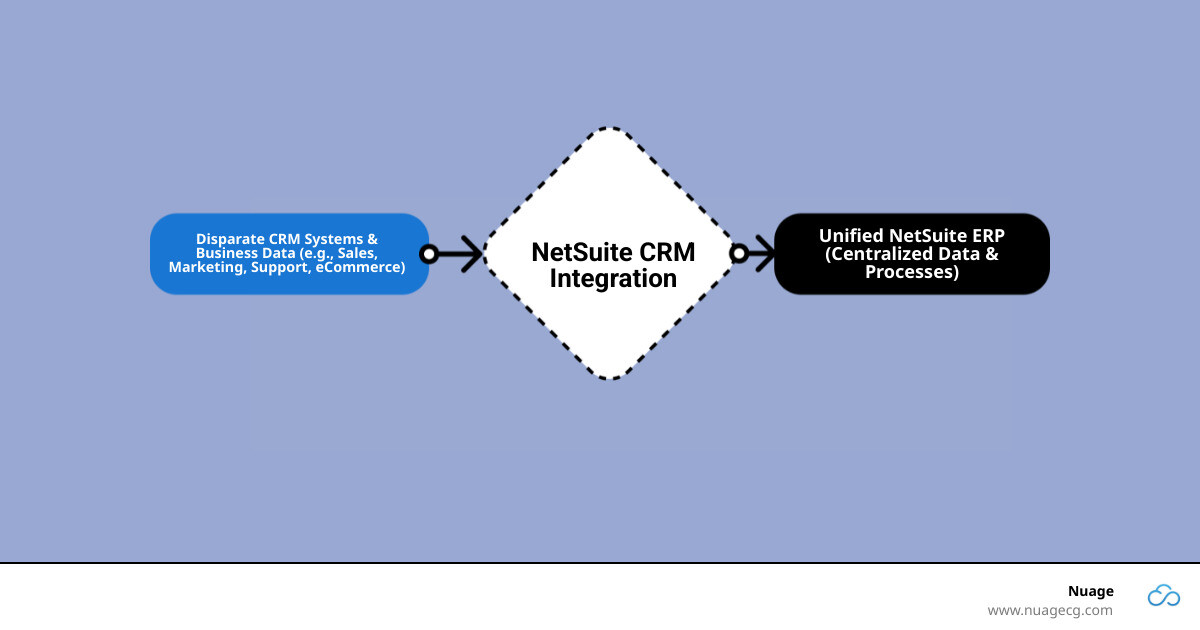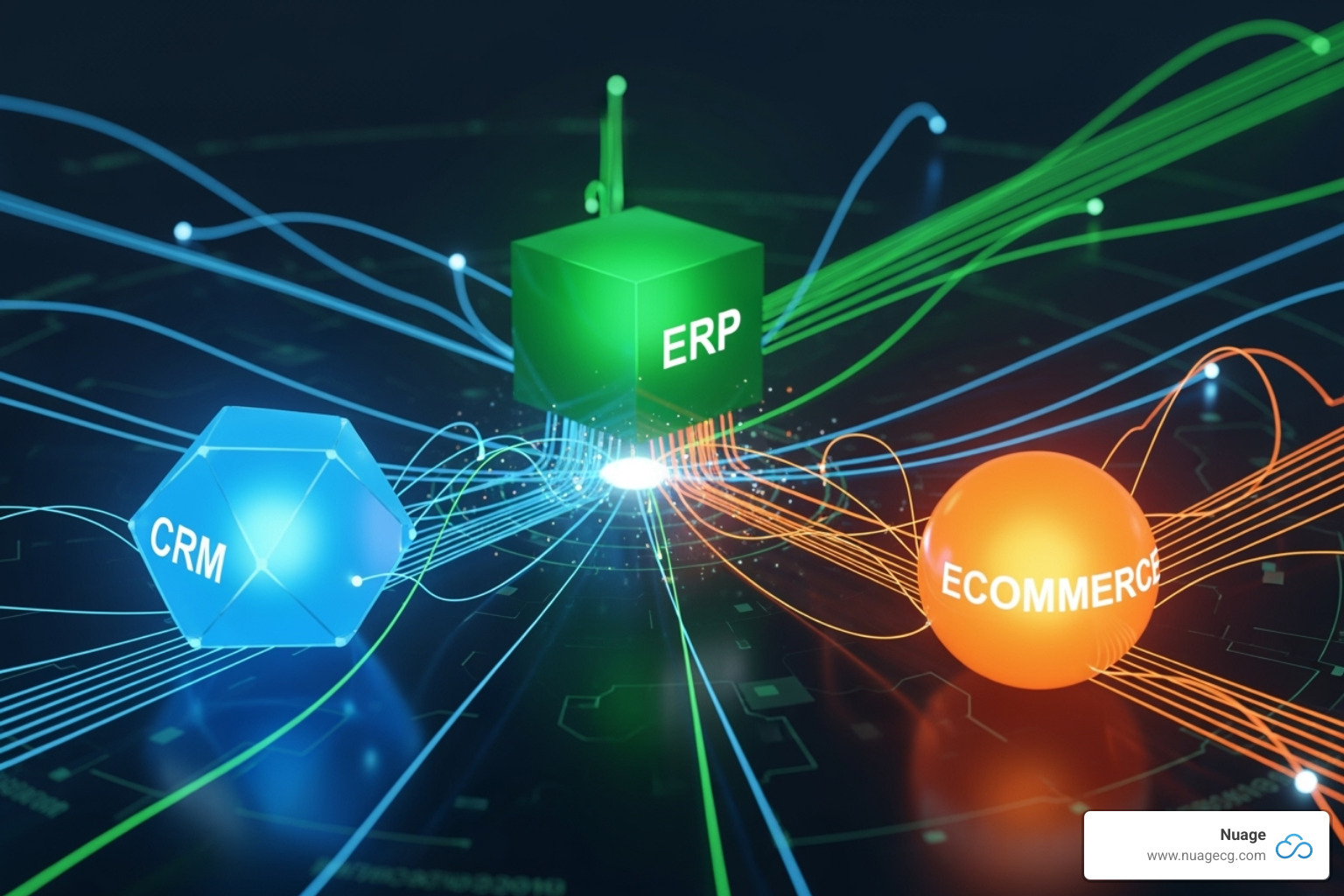Why NetSuite CRM Integration Transforms Business Operations

NetSuite CRM integration connects your customer relationship management tools with NetSuite’s ERP system to create a unified business platform. Here’s what you need to know:
Key NetSuite CRM Integration Options:
- Salesforce – Advanced analytics and customer data management
- HubSpot – Marketing automation and sales pipeline management
- Shopify/WooCommerce – eCommerce and inventory synchronization
- Zendesk – Customer support and ticket management
- Stripe/Bill.com – Payment processing and billing automation
Primary Benefits:
- Eliminates data silos between departments
- Reduces manual data entry and human error
- Provides real-time visibility across customer touchpoints
- Streamlines order-to-cash processes
Most businesses only use 20% of NetSuite’s potential. Integrating your CRM tools opens up the other 80% by creating seamless data flows.
A proper NetSuite CRM integration transforms disconnected processes into a cohesive operation, giving sales instant inventory data, finance real-time revenue updates, and customer service complete order histories. The challenge lies in managing complex requirements, data synchronization, and system performance.
I’m Louis Balla, CRO and partner at Nuage. With over 15 years steering NetSuite CRM integration projects and installing hundreds of third-party NetSuite applications, I’ve seen how the right strategy drives transformational growth for businesses ready to bridge the NetSuite divide.

Simple NetSuite CRM integration word guide:
Understanding NetSuite CRM Integration
Your sales team excels with their CRM, and your operations team manages orders efficiently in NetSuite. The problem? These systems often operate in silos, unaware of each other. At Nuage, we frequently see companies using NetSuite as their core ERP alongside specialized CRMs that excel at specific customer relationship tasks.
NetSuite CRM integration builds a data superhighway between these systems, eliminating manual data entry and ensuring data consistency. When we integrate your external CRM with NetSuite’s ERP, sales data flows automatically into NetSuite, connecting with inventory, financials, and shipping. In return, NetSuite sends real-time updates on order status, payment history, and product availability back to your CRM.
The result is a single source of truth. Your sales team knows what’s in stock, finance sees revenue instantly, and customer service has complete order histories. After 20+ years in digital change, we know the best NetSuite CRM integration doesn’t just connect systems—it transforms your entire business.
Key Benefits of NetSuite CRM Integration
A successful NetSuite CRM integration delivers tangible benefits that impact your daily operations and bottom line.
- Time-saving: Integration automates tedious tasks like copying customer details or updating order statuses across systems. This frees your sales reps to sell and your marketing team to focus on campaigns, not data hunting.
- Cost reduction: Beyond saving on labor, automation eliminates expensive mistakes from manual processes, such as overselling inventory or incorrect billing.
- Error minimization: Automated data sharing between your CRM and NetSuite eradicates typos and transcription errors. Your customer data remains clean and reliable across every touchpoint.
- Operational efficiency: With integrated systems, your business runs seamlessly. Sales can promise accurately based on inventory, finance has a complete customer journey view, and service can resolve issues faster. This holistic view enables quicker decision-making and a superior customer experience.

Common Challenges and Solutions
NetSuite CRM integration can present challenges, but with over two decades of experience, we’ve learned how to steer them effectively.
- Integration challenges: Different systems have unique data structures and business logic. Bridging this gap requires deep expertise in both platforms and a clear understanding of your business workflows.
- Data synchronization: Deciding on real-time vs. batch updates and handling data conflicts is crucial. A solid strategy is needed to prevent conflicting information and maintain a single source of truth.
- Custom APIs: When standard connectors don’t fit your unique processes, custom APIs are necessary. Building these requires specialized development skills with NetSuite’s SuiteTalk web services and SuiteScript.
- SuiteApps: NetSuite’s marketplace offers many pre-built solutions, but choosing and customizing the right one to fit your specific needs can be overwhelming.
Overcoming these challenges requires careful planning and a partner who knows NetSuite inside and out. That’s the expertise we bring to every integration project.
Top NetSuite CRM Integrations
While NetSuite is powerful alone, its true potential is opened up when connected to the specialized tools your teams love. Instead of forcing teams to abandon platforms like HubSpot or Zendesk, NetSuite CRM integration creates a unified ecosystem where all tools work together seamlessly.
HubSpot NetSuite Integration
Integrating HubSpot with NetSuite aligns your marketing and sales teams. Marketers can use HubSpot’s powerful marketing automation, and the rich lead data flows directly into NetSuite. This gives your sales team full context on every lead, including all marketing interactions, right within their workspace. When a lead converts, their information automatically creates a customer record in NetSuite, streamlining sales management.
Salesforce NetSuite Integration
Integrating Salesforce with NetSuite creates a powerhouse for business intelligence. Your sales reps see real-time inventory, pricing, and order status within Salesforce, while finance benefits from automated order-to-cash processes. The combined analytics capabilities allow you to track the entire customer journey, from lead source to final payment, providing insights that drive profitability.
Shopify NetSuite Integration
For eCommerce businesses, integrating Shopify with NetSuite prevents overselling by syncing inventory in real-time. Orders from your Shopify store automatically appear in NetSuite for fulfillment. The integration also streamlines payment gateways, ensuring customer payments, refunds, and chargebacks flow seamlessly into your financial records, eliminating manual reconciliation.
Magento NetSuite Integration
Magento offers deep customization for complex business processes. When integrated with NetSuite, it streamlines the entire order-to-fulfillment cycle. Product catalogs, pricing, and inventory sync automatically, and order details flow into NetSuite for processing. This gives your customer service team a complete view of every interaction, leading to a significant sales boost from improved efficiency and customer satisfaction.
Bill.com NetSuite Integration
Integrating Bill.com with NetSuite automates your accounts payable and receivable workflows. This billing automation solution handles invoicing, enforces payment terms, and provides clear cash flow visibility. Your finance team is freed from manual data entry to focus on strategic tasks, while approval workflows ensure accuracy and compliance.
Amazon NetSuite Integration
Selling on Amazon requires automation to handle high volume. Integrating with NetSuite creates a seamless flow from order to delivery. Orders import into NetSuite, inventory updates in real-time, and shipping confirmations push back to Amazon. This provides customers with accurate order tracking and ensures perfect inventory management across all sales channels.
Zendesk NetSuite Integration
Integrating Zendesk with NetSuite empowers your customer support agents with context. They can view a customer’s full order status, billing details, and purchase history directly within the ticket management interface. This real-time data access leads to faster resolutions and happier customers.
WooCommerce NetSuite Integration
For WordPress users, integrating WooCommerce with NetSuite simplifies online store management. Customer orders flow automatically into your fulfillment process, while product data and inventory levels stay synchronized. Shipping information updates automatically, keeping customers informed and improving their experience.
ADP NetSuite Integration
Integrating ADP with NetSuite streamlines HR operations by creating seamless data flows between your HR and financial systems. Employee information, payroll expenses, and benefits costs sync automatically with your general ledger, providing your finance team with accurate data for budgeting and reporting.
Stripe NetSuite Integration
Integrating Stripe with NetSuite automates payment processing and cash reconciliation. Every payment, refund, and fee is recorded accurately in your NetSuite records, ensuring financial accuracy and eliminating the tedious work of manual reconciliation. This provides real-time visibility into your cash flow.
How to Set Up CRM in NetSuite
Many businesses overlook that NetSuite CRM integration can be achieved using NetSuite’s powerful, built-in CRM features. This native approach avoids the complexity of managing separate platforms and seamlessly connects your sales activities with existing ERP data like inventory, payment history, and order status.
Step-by-Step Guide
Setting up NetSuite’s native CRM is a straightforward process. As your NetSuite Optimization Engine, we’ve guided hundreds of companies through these steps.
- Enable CRM Features: Navigate to Setup > Company > Enable Features. Activate the modules you need, such as sales force automation, customer support, and marketing automation.
- Define CRM Lists: Go to Setup > Sales > CRM Lists. This is your command center for configuring sales territories, which helps assign leads and customers to the right team members.
- Create Sales Roles: Define specific roles like Sales Rep or Sales Manager, each with custom permissions and access levels. This ensures team members only see the data relevant to their position.
- Assign Employees: Link your team members to their designated sales roles, giving them the right tools and data visibility.
- Configure Preferences: Customize lead statuses, opportunity stages, and custom fields to match your unique sales process and data tracking needs.
For detailed documentation, the Oracle Help Center is a comprehensive resource. However, partnering with an expert ensures your setup is optimized from the start, preventing future complications. A proper setup connects your sales cycle to financials and operations, driving the operational efficiency that transforms businesses.
Best Practices for NetSuite CRM Integration
Successful NetSuite CRM integration requires more than just connecting systems; it’s about building a scalable foundation that simplifies your team’s work. Based on our two decades of experience with companies using NetSuite, a clear strategy is paramount to avoid messy data and frustrated teams.
- Develop a Clear Integration Strategy: First, define the business problems you’re solving. Map current workflows to identify which data needs to sync, how often, and which processes to automate for the biggest impact.
- Establish Data Governance: Create rules for your data. Determine ownership of records that exist in both systems and define a process for handling conflicting updates. Strong governance prevents data chaos.
- Implement Continuous Monitoring: Integrations need regular health checks. Set up alerts and dashboards to catch data flow issues or errors before they become major problems.
- Plan for Scalability: Build your integration with the future in mind. Your solution should accommodate growth, whether it’s adding new platforms or handling increased data volumes.
Leveraging iPaaS Solutions
Integration Platform as a Service (iPaaS) solutions offer versatile and reliable tools for NetSuite CRM integration.
Celigo is a robust iPaaS platform with pre-built integration templates for common NetSuite connections, enabling faster deployment. Its AI-powered error management identifies and suggests fixes for issues, acting like a 24/7 monitoring specialist. These prebuilt integrations include business logic and error handling that would otherwise take months to develop.
Custom API Integrations
When off-the-shelf solutions don’t fit your unique business needs, custom-built APIs are the answer. NetSuite’s developer tools facilitate this process.
- SuiteTalk: This web services API provides secure, real-time access to NetSuite data.
- SuiteScript: This tool allows for building sophisticated business logic directly within NetSuite using JavaScript.
- JavaScript hooks: These enable event-driven integrations, such as automatically creating a support ticket when a high-value customer places an order.
Custom development is a strategic investment for businesses whose unique processes provide a competitive advantage, ensuring technology supports their workflow.
Frequently Asked Questions about NetSuite CRM Integration
With over 20 years in digital change, we’ve answered countless questions about NetSuite CRM integration. Here are the most common ones.
What CRMs integrate with NetSuite?
NetSuite‘s open architecture allows it to integrate with nearly any CRM. Beyond major platforms like HubSpot and Salesforce, we’ve successfully connected many others, including:
- Email Marketing: Constant Contact, Mailchimp
- Sales & Pipeline Management: Nimble, Ploomes, Pepperi (for field sales), Spiro (AI-powered)
- Customer Service & Custom Apps: Conversational Cloud, Quickbase
The key isn’t finding a CRM on a list, but designing an integration that solves your specific business challenges. At Nuage, we assess your systems to design the most effective integration path.
What is the best integration platform for NetSuite?
There’s no single ‘best’ platform; the right choice depends on your business complexity, technical resources, and integration needs. However, three platforms consistently stand out in our experience:
- Mulesoft: Ideal for complex, enterprise-grade integrations with high data volumes, though it requires more technical expertise.
- Jitterbit: A strong balance of robust functionality and user-friendliness, often recommended for mid-sized businesses.
- Celigo: A leader in the NetSuite ecosystem, its Integrator.io platform offers excellent pre-built integrations and AI-powered error management.
We help clients analyze their requirements to recommend the platform that best aligns with their strategic goals.
How do I set up CRM in NetSuite?
Using NetSuite’s built-in CRM is often the smartest first step for consolidating systems. The process involves a few key configurations:
- Enable Features: Go to Setup > Company > Enable Features to activate sales force automation, customer support, and marketing modules.
- Configure CRM Lists: In Setup > Sales > CRM Lists, define sales territories, lead routing rules, and opportunity stages that match your sales process.
- Create and Assign Roles: Establish sales roles (e.g., Sales Rep, Manager) with specific permissions, then perform the employee assignment to give your team appropriate access.
The native CRM is already integrated with your financial and operational data, eliminating the need for a separate connection. While Oracle’s Help Center has detailed guides, expert guidance during setup ensures your foundation is solid and scalable.
Conclusion
NetSuite CRM integration transforms your business by connecting your CRM with NetSuite’s ERP system, eliminating data silos. This creates a unified operation where your teams are empowered with real-time, accurate information—from sales having live inventory data to finance seeing instant revenue updates.
Whether integrating HubSpot, Salesforce, Shopify, Bill.com, or Zendesk, the right strategy is key to unlocking efficiency. At Nuage, we’ve spent over 20 years guiding businesses through these digital changes. As your NetSuite Optimization Engine, we help you find the best solution for your unique needs.
This may involve leveraging an iPaaS solution like Celigo for its pre-built templates or building custom APIs to support your unique processes. Our goal is to provide a partner who understands both the technical landscape and your business reality.
Your integration journey is an ongoing process of optimization. As your business evolves, we help you build scalable solutions that grow with your success.
Ready to transform how your systems work together? Whether you’re facing data synchronization challenges or want to eliminate manual entry, we’re here to guide you through every step of your digital change journey.
Last Updated: January 3, 2026
Looking for help optimizing your NetSuite? Contact our team for a free consultation.